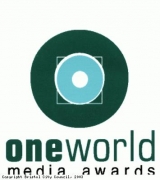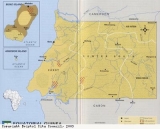The picture now
Since returning from my trip to Bioko Island, I have set up a charity called the Rivaldo Tehache Fund.
In Ureka a newborn baby had recently lost his mother. She had died at a very young age, and evidence of the funeral was still visible when I arrived.
I was asked to take this baby as he was motherless and I could offer him a better chance in life. His name is Rivaldo. On my return to England, I decided to help support the Luba orphanage and Ureka Primary School.
Luba is a village on the east coast of the tiny island of Bioko in Equatorial Guinea and situated some 50 kilometres from Ureka at the southern end of the island. There is no road to the community of the Bubi people in Ureka. The nearest secondary school and hospital are in Luba and you must get there by hiking or by boat. Village people are very poor and fishing is no longer a viable trade. The Urekan children from age 11 upwards must attend school in in Luba. The primary children are all taught together in one school room in the secluded village.
In March 2002 I visited Ureka after walking for the best part of 10 hours through the tropical rainforest. I went in search of my ancestral family line – the Bubi, and found a baby who had recently lost his mother. Getting the right medication and check-ups was proving to be difficult for the family. Between us we thought the baby could receive immediate care and attention from the hospital in Luba.
The plane hadn’t even landed in Britain and I was making plans to support the people in Bioko. It was soon arranged that our families and friends in England would find ways to help the orphanage in Luba. On 2nd December 2002, the orphan Rivaldo Tehache celebrated his 1st Earthday. This has inspired me to find more ways of fund raising, not only for Rivaldo who continues to improve, but also the other children at the orphanage and the local primary school in Ureka.
What the future holds for me is to continue to provide support to the orphans and underpriviledged children in Luba. This will include regular donations for staff salaries, for food, clothing and medical care for the children. To care for and feed an orphan costs around £20 a month. In the long run we wish to be able to provide resources and support for any sick child in Ureka needing treatment in Luba. I also plan to raise funds to support the school in Ureka – paying teachers’ salaries, teaching equipment, repair and maintenance of the school.
Help with fund raising or donations will be gratefully received. We have photos and information available to anyone interested in sponsoring the Rivaldo Fund Project. (No money is deducted for administration costs). Please contact Beaula McCalla on the following email address: .(JavaScript must be enabled to view this email address)
Since my return from Bioko, I have also been making contact with other Bubi people in England and Spain. I have met up with other newly found Bubi, sharing our stories of how we found our roots – like finding each other like in the hold of the ship scene in the television series Roots.
On the 14th day of each month, my family celebrates our Bubi family day. We celebrate and remember our found heritage. On this day, family members light candles, listen to Bubi music, write letters to those on the continent. The children may colour in pictures of Afrikan images, learn more about Bioko Island, the flag, the geography etc., it is a day to celebrate and commemorate.
I have been very keen to keep in contact with my new family in Bioko. The language of commerce is Spanish so I took a one year OCN course in Spanish. I hope to continue to study the language.
Since taking part in the DNA project which took me to Bioko, my picture with my cousin Beatriz has appeared in a glossy book called DNA – The Secret of Life. It celebrates 50 years of DNA and how it has changed the world. In 2003 the BBC2 television documentary Motherland – A Genetic Journey which was made about the project, won a prestigious award, called the One World Media Award. This award exists to support those who use the media to foster understanding, offer a critical voice and recognise the stories that matter to people everywhere. The film was made by Takeaway Media for BBC2.
I feel very humble and honoured to have experienced this amazing re-connection; to be able to complete the triangular journey from Afrika circa 1500 to Jamaica 1960 to England and back to Afrika 2001. I give thanks to the ancestors who have paved the way for me and to the Motherland for bringing forth my original family.
Hotep (peace)




